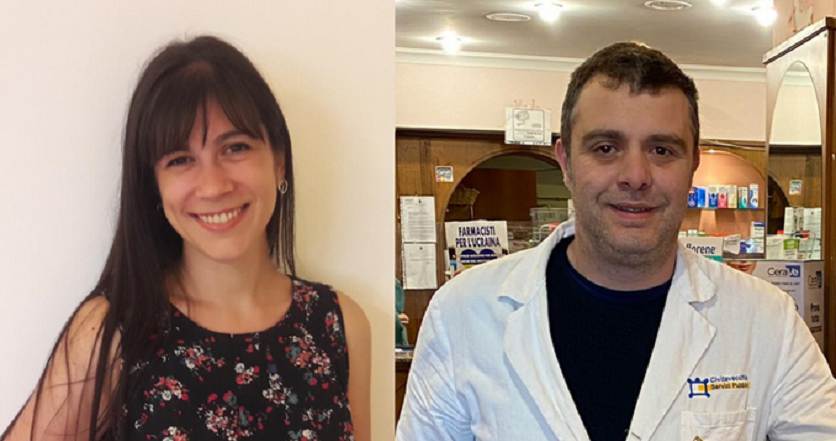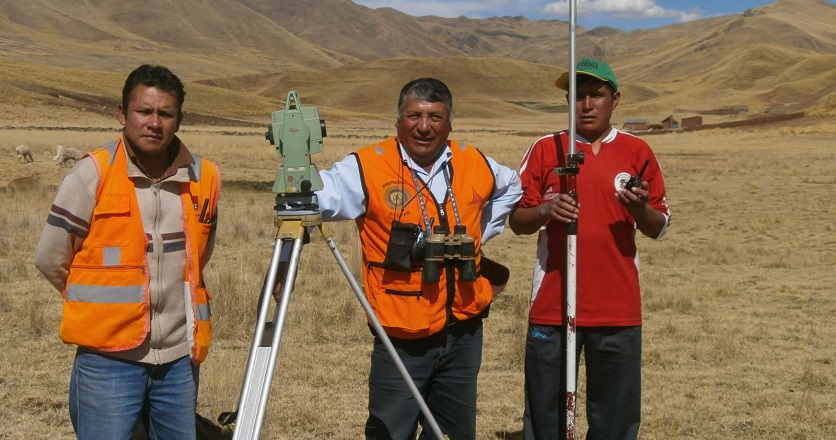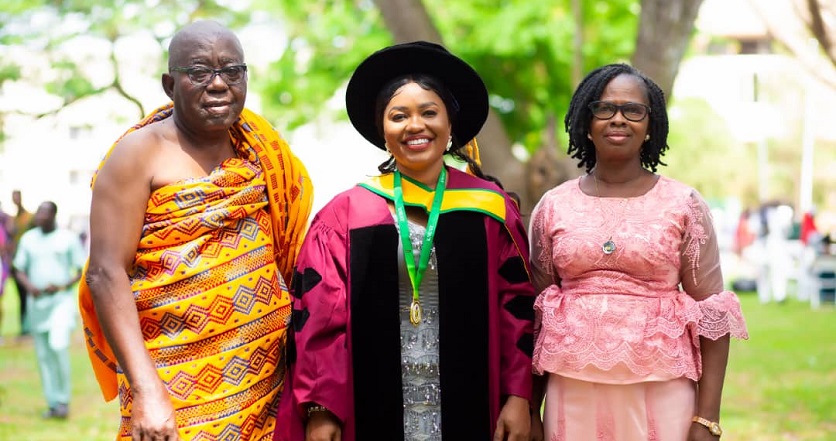Inheriting My Grandmother’s Indomitable Spirit of Peace
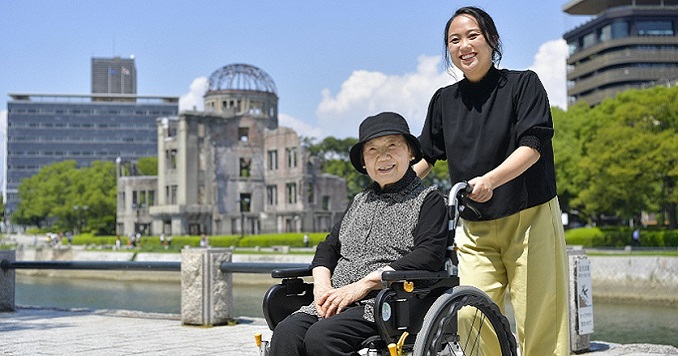
Inspired by her grandmother’s unwavering strength living as a survivor of the atomic bombing of Hiroshima, Japan, Kazumi Kuwahara, as a third-generation survivor, resolves to embody and carry forward her grandmother’s deep commitment to peace.
My Hibakusha Grandmother’s Story
In 1945, my grandmother, Emiko Yamanaka, was a sixth grader living with her family of nine in Hiroshima, Japan. On the morning of August 6, she was on her way to the eye doctor when the cloth strap on her geta clogs broke. A man at a nearby factory who saw this handed her some hemp and said, “Come fix it inside, it’s too hot out here.” Just as she entered the building and crouched down to fix the strap, she was blinded by an intense light, as if the sun had crashed to the Earth. In the same instant, she was struck to the ground by a powerful blast that left her struggling to breathe.
Trapped under the building 1.4 kilometers from the hypocenter of the atomic bomb that hit Hiroshima City, my grandmother cried out for help. A man passing by heard her and reached out, but when she clung to his arm, his skin slipped off. Nevertheless, he managed to pull her out. She narrowly escaped the flames that rose from the rubble, witnessing horrific, hellish scenes along the way, before finally making it back to her house some 1.5 kilometers away. To her immense relief, her family was safe.
Love and Discrimination as a Hibakusha
I’ve come to understand that the path to nuclear disarmament lies in steadily fostering a culture of peace in people’s hearts, one person at a time.
However, her suffering did not end with the war. Many years later, at the age of 18, she fell in love with a young man. They pledged to marry, but his mother took her aside, saying, “Promise not to tell my son what I am about to say to you. I simply cannot accept you, a survivor of Hiroshima, as a bride in our family.” It broke her to pieces.
Five years later, a marriage was arranged for her with a man called Akio. Over time, they nurtured a genuine love and married in 1957. Sometime after, she discovered she was pregnant. However, due to her tuberculosis, the doctor informed her that she might not survive childbirth. But she refused to give up. She wanted to prove that even an atomic bomb survivor could have a child and become happy. After enduring three days and three nights of labor, she gave birth to a baby girl.
Encountering Buddhism Transforms Outlook
In 1960, after being introduced to Buddhism by a relative, my grandmother and her entire family joined the Soka Gakkai. She continued to suffer from the aftereffects of the atomic bombing: on top of thrombocytopenia (failure of the blood to clot), atomic bomb cataracts, ischemic heart disease and thyroid cancer, chocolate-colored glass fragments kept popping out of painful red lumps under her skin—remnants of the bombing when she was pierced by countless shards of glass. However, her outlook underwent a profound transformation upon embracing Buddhism. Despite the physical toll of atomic bomb disease, she remained remarkably positive and in high spirits.
In 1988, President Daisaku Ikeda penned a poignant poem about the unimaginable pain, grief and discrimination that atomic bomb survivors had to endure, in which he further articulated their noble mission of creating a peaceful world. My grandmother, deeply touched by his words and compassion, vowed to work even harder for peace and to share her experience as an atomic bomb survivor.
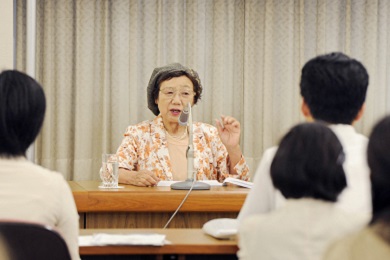
Recounting her experience of surviving the atomic bomb exacted a heavy emotional toll on my grandmother. It gave her nightmares. Yet, she was determined to never allow anyone to endure the tragedy she had experienced ever again. To date, she has spoken about the threat of nuclear weapons and the importance of peace in over ten countries, including Japan, including giving her testimony at the UN Headquarters in Geneva in March 2011.
Inheriting a Commitment to Peace
I was in the eighth grade when I first learned about my grandmother’s atomic bomb experience. I was overwhelmed and deeply shaken. A year later, I expressed the following sentiments at a speech contest in Hiroshima Prefecture: “I was outraged that atomic bomb survivors were not even allowed to get married.” “As a representative of the younger generation, I will continue to advocate for world peace, an ideal that we must strive to achieve.” I received the Hiroshima Prefecture Governor’s Award for my speech, and it brought great joy to my grandmother to see me carrying on her commitment to peace.
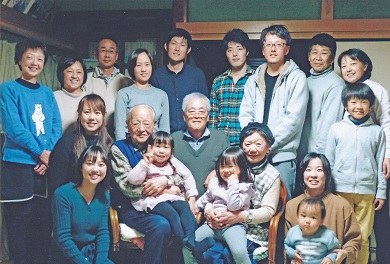
During high school, I voraciously read the many books President Ikeda coauthored with leaders and experts around the world who were from various sectors of society. Through these dialogues, I keenly realized the importance of respecting individuals with differing opinions. I also recognized the necessity of cultivating knowledge to advocate for peace effectively, instead of relying solely on emotional appeals.
Later, I chose to pursue my studies at the Faculty of Law at Soka University in Japan with the aim of exploring the abolition of nuclear weapons from the perspective of international law. I actively participated in the school’s English study group and engaged with international students to improve my English. During my first year, I also studied abroad at the University of Buckingham in the UK, where I delved deeply into issues related to peace and human rights.
During my time in the UK, I was invited to share my grandmother’s story at an event in London that brought together people from numerous faith traditions. I struggled to write my speech as I reflected on my grandmother’s challenging life. I remembered once asking her why she always wore a smile, to which she replied, “Because I couldn’t have survived unless I kept smiling.” Her words carried great weight. Although I realized I might never fully understand the depth of the suffering she went through, I resolved to stand by my grandmother and continue honoring her courage.
Addressing the audience in the large hall that accommodated 2,000 people, I spoke slowly and deliberately. When I finished, the audience rose to their feet, one after another, applauding warmly. Many approached me afterwards, conveying their heartfelt wishes for my grandmother’s happiness. I felt proud that my grandmother’s story had touched the hearts of so many people from diverse backgrounds and cultures.
Turning Point and the Heart of Peace
In 2018, after graduating from university, I made the decision to return to Hiroshima and pursue grassroots peace activities near my grandmother. Once home, I embarked on a quest to discover my life’s purpose and mission.
The turning point came when I traveled to Germany for several weeks and participated in a Soka Gakkai meeting in Berlin. Surrounded by the warmth of the members, I found the courage to open up and share my feelings for the first time. Everyone listened attentively and offered their unwavering support, instilling in me a newfound confidence in my pursuit of peace.
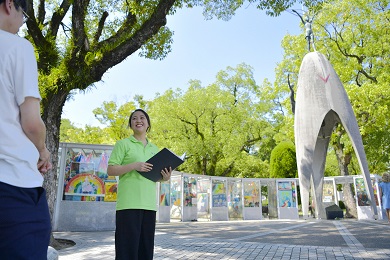
Three years ago, I signed up as a Hiroshima Peace Volunteer, becoming the youngest guide among more than 200 volunteers, and also became certified as a regional interpreter guide for Hiroshima prefecture. When guiding visitors through Hiroshima Peace Memorial Park and showing them the Atomic Bomb Dome, I often recount my grandmother’s story, particularly her aversion to the riverbank due to the tragic events that unfolded there in the aftermath of the atomic bombing.
Each visitor has a unique nationality and upbringing, and as I interact with them, I constantly ask myself how best to share Hiroshima’s significant history. Some visitors seem to have been brought here involuntarily, and sometimes I wonder how much they understand. But there are others who come back to visit the Cenotaph for the Victims of the Atomic Bomb again after listening to what I have shared. It is a deeply rewarding moment.
I’ve come to understand that the path to nuclear disarmament lies in steadily fostering a culture of peace in people’s hearts, one person at a time. This is the invaluable lesson I have learned from my grandmother’s indomitable and resilient spirit. I sincerely hope that my humble efforts can inspire others and kindle in their hearts the desire to contribute to peace. I remain committed to fulfilling the promise I made to my grandmother as an advocate for peace.
Adapted from an article in the August 3, 2023, issue of the Seikyo Shimbun, Soka Gakkai, Japan, and from the book Hiroshima and Nagasaki: That We Never Forget.





